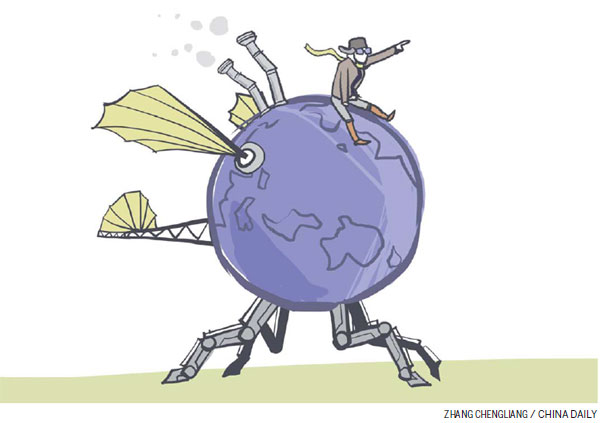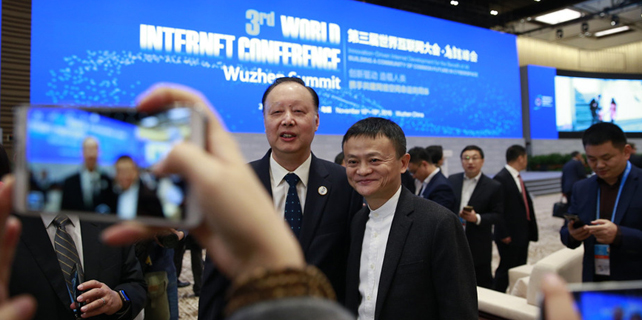What a difference a half-century makes
In a span of 50 years, UN development organization has seen China transformed - from waking giant to green trailblazer
Fifty years ago, the United Nations Industrial Development Organization was created to support developing countries in their quest for industrialization after the process of decolonization had doubled their number in the UN General Assembly. China has been a strong partner and supporter of UNIDO throughout. The 50th anniversary of UNIDO invites us to reflect on this partnership - to look back and also take a glance at the future.
Cooperation between China and UNIDO began in 1972 after the People's Republic of China became the lawful representative of the Chinese people in the UN system. Since then there have been three broad phases of cooperation. Each was a response to historical developments within China at the time. With each phase, this cooperation has been strengthened.

Until the pre-reform era in China came to an end in 1978, the country was not a recipient of technical assistance from UNIDO. Rather, it was China that provided contributions to UNIDO to support projects to promote self-reliance in other developing countries.
In the late 1970s, China started to embark on its well-known economic reforms and opened up to the outside world, ushering in a period of dynamic growth of its productive forces. The years from 1979 onward thus witnessed a second phase in which UNIDO began to actively assist China's industrialization process.
Since the beginning of the new millennium, and after China's accession to the World Trade Organization in 2001, the country has become the industrial powerhouse it is today - the biggest exporter globally and the second-largest economy in the world. UNIDO's cooperation with China has entered a third stage, in which the focus has shifted away from promoting industrial growth. Awareness that China's impressive economic growth process has come at a price has meant that cooperation is now centered more on protecting the environment.
Looking back, UNIDO's cooperation with China over the past 50 years has covered a wide range of areas. These run from technology and knowledge transfer, skills development, institutional capacity-building, trade and investment promotion, to programs for resource efficiency, cleaner production and energy management. There are few doubts that these programs have played an important role in China's economic and social development. President Xi Jinping himself recognized UNIDO's contribution recently, emphasizing that the organization has made a positive contribution to China's reforms. Two stories serve to underline this notion.
When the Government of China under Deng Xiaoping opened the country to create "Socialism with Chinese characteristics", special economic zones played a major role. But back then the country had limited cooperation with the outside world. It was difficult, if not impossible, for China to study other countries' practices, especially those of the West. UNIDO was one of the few international organizations willing to play the role of intermediary. Utilizing its international networks, UNIDO organized study tours for a Chinese delegation led by Jiang Zemin, who later became China's president. The insights gained fed directly into China's legislation for the operation of SEZs and planted the seed for the establishment of the first zones. Today, other developing countries are experimenting with SEZs and industrial parks in order to try and replicate China's successes.
Another recent success story is the joint work to help China meet its obligations under major multilateral environmental agreements, especially the Montreal Protocol on Substances that Deplete the Ozone Layer, the Stockholm Convention on Persistent Organic Pollutants and the Minamata Convention on Mercury. Joint projects under these agreements have played a significant role in promoting China's transition to green industry. As of today, China's phase-out of Ozone-harming agents accounts for a remarkable 55 per cent of the total phase-out in developing countries.
With the adoption of the 2030 Agenda for Sustainable Development by world leaders in September 2015 and its attendant 17 Sustainable Development Goals, a new stage of cooperation between China and UNIDO is about to begin. China has already signaled strong ownership of the SDGs, which are indeed well reflected in priorities in the 13th Five Year Plan (2016-20). The so-called "five new normals" of innovation, greening, opening, sharing and coordination contained in this plan will provide momentum for the implementation of key SDGs in China - especially those on infrastructure, inclusive and sustainable industrialization and innovation and sustainable consumption and production.

UNIDO aspires to play a strong role in supporting China in achieving these and other SDGs and in realizing a green, innovation-based economy that pays particular attention to inclusiveness and the demands of women and youth. The aim will be to further strengthen inclusive and sustainable industrial development and to support the government in its efforts to build Made in China into an international brand, as envisioned by the initiative of the same name (Made in China 2025).
There is ample reason to be confident, not least because the government has recently assumed leadership in the international development debate. This leadership role has been most obvious in China's strong role in last year's climate change negotiations. It also comes to the fore in China's current presidency of the G20, which places a premium on advancing industrialization in Africa and least-developed countries, as well as the New Industrial Revolution, also known as Industry 4.0. UNIDO had the privilege to support the Chinese government in these efforts too, and will continue to do so in the future.
Further testimony to the new role China is willing to assume in international development was President Xi Jinping's announcement, during the UN Summit that adopted the SDGs, of the establishment of a South-South Cooperation Fund for developing countries, with an initial volume of $2 billion (1.8 billion euros; 1.6 billion).
For UNIDO, China's commendable new role provides an opportunity to live up to two demands, namely continuing to cooperate "with China for China", while at the same time joining hands with China in its cooperation with other countries. This will include the Belt and Road initiative and the Forum on China-Africa Cooperation. As UNIDO is celebrating its 50th anniversary, its long-standing cooperation with China seems to have come full circle returning to where it started when China provided contributions to UNIDO for projects in developing countries in the early days.
China's sheer size requires UNIDO to place an increased emphasis on assistance at the normative and policy levels by supporting the government in developing standards for green industry, eco-industrial parks and corporate social responsibility. Another focus will be food safety management standards. The same standards will find application when supporting China's cooperation with other countries.
What does this mean in conclusion? During China's reform period Deng Xiaoping famously said: "If we can increase production, it doesn't matter whether operations are run privately - just like as long as a cat catches mice, it doesn't matter whether it is white or black."
While this may still be true, it certainly matters a lot today whether that same production is green or not. UNIDO's cooperation with China in the next 50 years will be guided by this wisdom.
The author is director-general of UNIDO.
The views do not necessarily reflect those of China Daily.
(China Daily European Weekly 11/18/2016 page9)


















